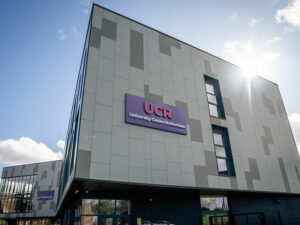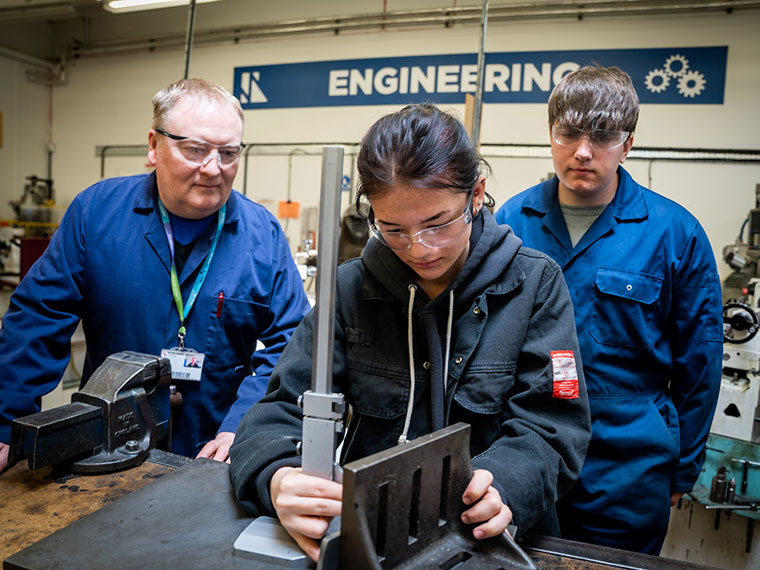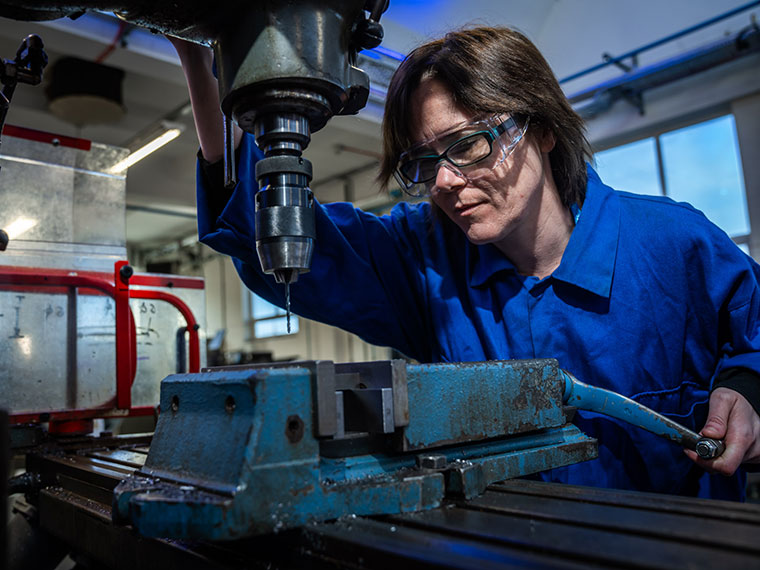
Spotlight on… Engineering department
Are you a hands-on learner, an innovator, and a problem solver that loves a technical challenge? Then engineering is probably in your career plan.

Whether you’re interested in understanding how things work, improving processes and materials, or are full of creative ideas, develop your skills and knowledge by studying a higher education course at University Centre Rotherham.
Read on to find out how the engineering department at University Centre Rotherham can help you achieve the qualifications needed to progress in the engineering industry.
What is a career in engineering?
A career in engineering is all about solving real-world problems using science, maths, creativity, and technology.
Engineers design, build, test, and improve everything – from bridges and engines to robots and clean energy systems. They find practical solutions to technical challenges, whether that’s making something faster, safer, cheaper, more efficient, or more sustainable.
Being an engineer can be a rewarding way to make an impact on the world around you, particularly if you have an interest in clean energy, life-saving tech, or sustainability.

Most engineers choose a specific branch of engineering such as:
- Mechanical engineering – Designing blueprints, building and maintaining machines, engines, or tools. You could be an engineering technician, design engineer, or a maintenance engineer.
- Electrical/electronic engineering – Creating and improving various electrical systems and equipment. You could be an engineering technician working in power generation, telecoms, automation and robotics, or consumer electronics.
- Civil engineering – Designing and planning construction projects in the public and private sector such as bridges, buildings, and transportation, with a big focus on safety and risk management.
- Chemical engineering – Focusing on chemical processes and developing new materials for use in energy production, waste management, pollution control and medicines.
You could also go into more specialist areas like aerospace, automotive, or biomechanical engineering, or high-tech roles like renewable energy, forensics, or mechatronic engineering.
With experience, you could progress into roles like project management, research, consultancy or teaching.
Where could I work?
Engineers aren’t just found in factories or on construction sites. Depending on their field and specialty, engineers can work in a range of industries and environments.
That might be traditional settings like manufacturing plants or engineering firmsdesigning or maintaining machinery or infrastructure, or more specialised environments like hospitals and theme parks.
Some engineers work in laboratories and research facilities testing materials and designs in areas like biomedicine, aerospace, defence, and AI. While others head down the path of remote field work on oil rigs, power plants, and wind farms.
The possibilities in engineering really are endless.
What engineering courses could I study at University Centre Rotherham?
At University Centre Rotherham we offer both the HNC and HND in Engineering. These higher education courses are at level 4 and 5, equivalent to the first or second year of a traditional undergraduate degree.
A HNC or HND is a career-focused qualification designed with employers in mind. You’re not just learning theory, you’re gaining the practical and technical skills that companies actually want.
Many students who progress onto the HNC course will have done a T Level/BTEC or other relevant level 3 course in engineering, mechatronics, fabricating and welding or motor vehicle studies. This means they already have the underpinning knowledge of engineering needed to progress to the higher level of study. Level 3 Maths is particularly important to progress onto higher education in engineering.

There is also the option of doing the HNC or HND as a higher level apprentice via your employer. By doing an apprenticeship, your course fees will be covered by your employer’s apprenticeship levy and you will continue to be paid while you study.
Whichever route you choose, the HNC and HND courses are delivered on one day a week over an 18-month period. This means you can still work, earn money and gain experience at the same time, even if you aren’t on an apprenticeship.
There are two pathways to choose from: mechanical engineering or electrical/electronic engineering. The higher education courses have a broad range of modules, some of which are done on both pathways, such as maths, science, CAD design, and business improvement techniques.
Others are course specific. For example, the electrical pathway looks at automation, robotics and renewable energy, while the mechanical pathway focuses more on thermodynamics and machine processing.
After you complete your course, you could progress onto thefull engineering degree at levels 6 or 7 at other universities that offer the bachelor’s and master’s degrees.
Do I really need a higher education qualification to be an engineer?
You can enter the job market with a level 3 qualification in engineering. However, the HNC or HND is the standard qualification that all engineers should aspire to.
Along with gaining the advanced principles in maths, science and engineering to improve your industry knowledge, a higher education qualification equips you with the employability skills needed to stand out in a competitive industry.
Employability skills are just as important as technical know-how in engineering. Employers want people who can think critically, come up with creative, practical solutions, work well in a team, communicate clearly, and troubleshoot under pressure.
If you aspire to progress to leadership roles, most supervisor and management positions in engineering will require at least a level 4 or 5 qualification.
Engineering is always evolving, so there will always be an opportunity for lifelong learning and upskilling in new tools, materials, methods or environments. Doing a higher education course is a flexible and affordable way to upskill, particularly as it’s delivered on a part-time basis so you don’t need to sacrifice your existing career.
Plus, having more advanced skills and knowledge often leads to higher salaries than those without higher level qualifications.
I’m not already employed in engineering – can I still do the HNC or HND?
To advance onto the HNC or HND in engineering, you do need to have previously studied the fundamental principles of engineering. This should be at level 3, usually a T level or BTEC course.
However, whilst many of our higher education students are apprentices, you don’t need to be working in the industry to benefit from these higher level courses. As already mentioned above, the courses combine theoretical and practical knowledge with employability skills to ensure you’re ready for the world of work once you graduate.
Careers advice and guidance are embedded within all our higher education courses here at University Centre Rotherham. If you’re still unsure which engineering pathway to go down, or need help with preparing for work, we have dedicated higher education careers advisors who can support you with CVs and applications, interview prep, and personalised careers advice.
There’s no mandatory work experience required, but students are actively encouraged to look at work opportunities, with help available from our central placement team.
And because you’re working around apprentices, if you’re not already employed you will also gain experience (and valuable insight of the industry) from your peers.
If you decide to pursue an apprenticeship after finishing the HNC, you’ll have already done most of the work on the higher level apprenticeship (level 4) so could potentially enrol as a degree apprentice.
Why choose University Centre Rotherham?
The engineering department here at University Centre Rotherham is designed around our students’ needs. There are some brilliant, high-tech facilities including a CAD design lab, engineering workshop, mechatronics equipment, and a programmable logic controller.
Our town centre campus also has fantastic learning spaces with project rooms for group work and prototyping, plus access to a well-equipped library and digital learning tools.
You’ll be taught by experienced engineers with a wide skillset. Andrew Jordan teaches on the electrical engineering modules. He previously worked as a test engineer for an electronics manufacturer, working with companies like HP and Dell to repair test machines and debug failing circuit boards.
While the mechanical engineering modules are taught by chartered engineer, Lee Alexander. Lee has experience of working in military defence and aerospace engineering, analysing, testing and trialling components of welded structures in army machines and stress support functions in aeroplanes.

There’s a huge skills gap in engineering, particularly in the Sheffield City Region. Employers are keen to work with us here at University Centre Rotherham to ensure the courses we deliver are teaching those skills needed for the present and future workforces to be more efficient.
We have partnered with businesses like Europa Engineering and Brunton Shaw who act as employer academies. Their staff run guest lectures, masterclasses and careers advice events, giving you access to invaluable industry links.
You’ll be qualified to a high level faster than if you opted for the BEng degree. Plus the cost of a higher education at University Centre Rotherham is a much more affordable option – around half the price of the average annual degree course fees. And as most students live at home, they save on student halls rent and additional living costs.
Real life stories from our engineering students
Joseph Wilcock
Joseph studied up to level 5 on the HND in electrical engineering which he completed as a higher-level apprentice via his employer.
He says: “The facilities here are brilliant, it’s a modern building, it’s got a state-of-the-art library, and the teachers are really helpful. The engineering company I work for have a good relationship with University Centre Rotherham. They’ve always sent apprentices here and really like to upskill apprentices. I feel like I’m getting really good career progression here. As well as working, I’ve got the education to back it up and I’m really looking forward to the future.”
Jamie Leather
Jamie is also a HND in electrical engineering student here at University Centre Rotherham.
He says: “There’s lots of interesting things to learn about. The best thing about the course is the renewable energy side of things, regarding electrical vehicle technologies. Whether that be charging, how they charge, how we can use solar and hydrogen power to charge them, even wireless charging. My teachers have been absolutely phenomenal. They’ve got really good industrial experience, really good knowledge, and they really know what they’re talking about.”
Dillon Bunclark
Dillon went down the mechanical engineering pathway, completing his HND at University Centre Rotherham with a view to working in mechatronics.
He says: “My day-to-day involves virtual engineering, research projects, and a lot of mathematics. I’ve also learnt a lot of transferrable skills that will aid my career in robotics and automation. What I love about University Centre Rotherham is the teaching they provide, the help and support that you receive, and the friendships you make along the way.”





